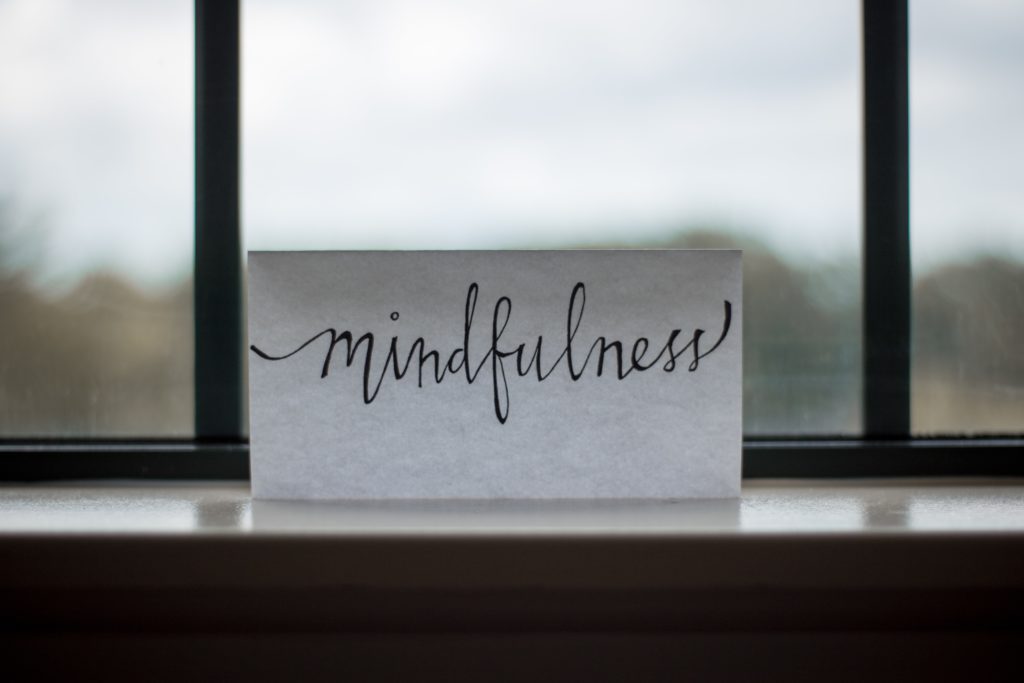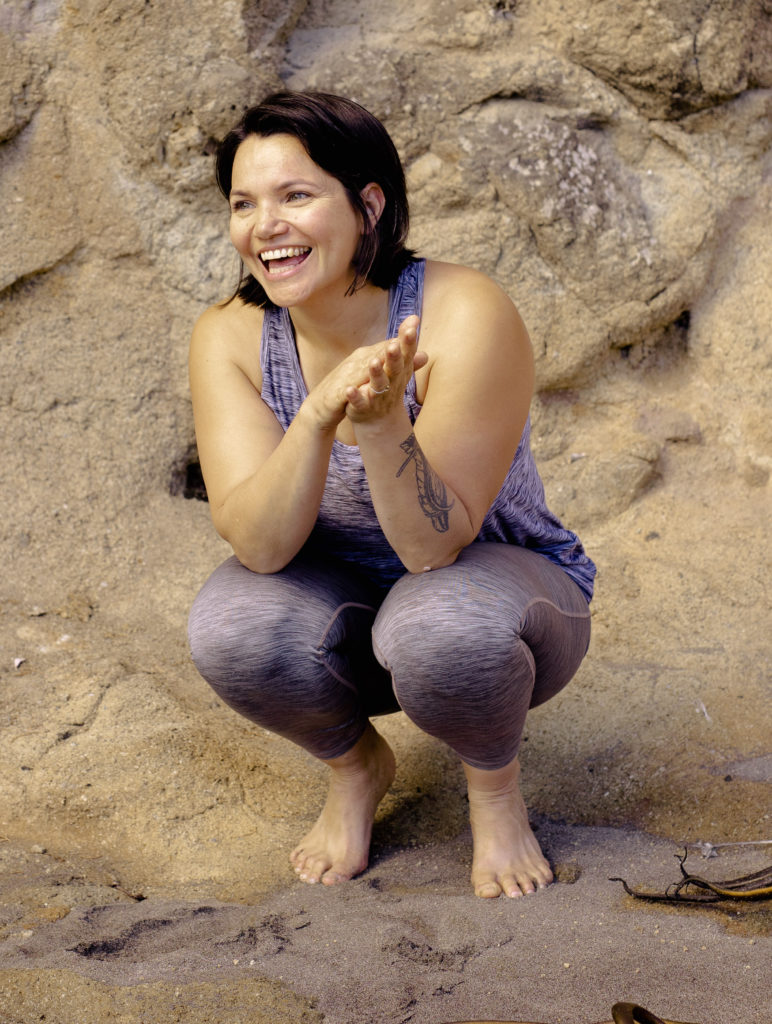
by Erica Viedma, Yoga with Erica
As a yoga teacher, I am aware of the delicate somatic connection between our physical sensations, thoughts and emotions. In yoga we often instruct people to stand tall and broaden the chest – opening the heart area. We ask people to open into areas that may have been guarded and held tight. At times I have observed myself and others struggle with the emotions that this kind of movement can evoke.
With this in mind, I have chosen to study towards a certification in Mindful Based Stress Reduction with the Mindfulness Training Institute Australia and New Zealand. I want to learn more about how to create safety for myself and my students. I am not only thinking of the adults that walk into my classes with their untold stresses, traumas and major life events. I am also thinking of the children that my business partner and I have sat with during our 6 years of teaching mindfulness in schools. Young children who carry the daily pressures of poverty, addiction, suicide, domestic violence, pandemics, sexual abuse, violent shootings, rascism, bullying in schools, earthquakes and sickness.
These are not stories from a country far away – these are the children who sit in our classes here in Ōtautahi.
Being faced with the reality that as human beings, we are all wounded in one way or another, has driven my desire to learn more about how we relate to our mind, body and wairua. Below are my reflections after completing the first module of mindfulness training with MTI. It is only a slice of the wisdom that emerged – with deep gratitude to my teachers and fellow students.
As you read this, please keep in mind that suffering comes in all shapes and sizes in our world. I sometimes feel myself dismissing my suffering because it appears lesser than others’ experiences, but there is no need to measure. We are all human and your suffering, no matter how large or small, is also worthy of care and attention.
Learnings in mindfulness for the wounded.
There are times in my life when I suffer. My body holds this suffering – not only the pain from today, but from my life till now and the lives of those around me. As my friend and as my teacher, you sometimes respond to my emotional suffering by offering me your solutions. I see your heart is in the right place, so please do not stop offering your kindness and the knowledge from your practice. But do understand this:
When I am suffering, I do not need your advice. What I need is help finding my own. Please don’t try to fix me because it only makes me feel lesser than; it makes me feel broken.
When you impose your model of care, your solutions and your values on me, you assume you and I are living the same life. Unless you come and sit in my kitchen and share kai with me, unless you walk in my shoes for longer than one mile – then you are not me and you are not my savior. When faced with my emotional pain, it may make you feel better to offer me advice, techniques and learnings that have worked for you in your life, your culture and your whanau. But when it comes to how I feel, deep change can only come from deep within me.
Instead listen, sit with me, lend me your courage as I feel my pain, as I feel my way to my own joy – not your aspirations for me but my own. You may value feelings of peace and quiet and wish those for me, but don’t you dare silence me. Allow me the space to find quiet and stillness in my own time. I will feel for the edges of the deep hole I am in, I will feel for the hands of those who are willing to be in this hell with me and we will hold on till the light comes.
In the meantime, I will not apologize for my screams disturbing your peace, because we are all deserving of our place in this world. I am human like you and remember you are human like me, and one day you will cry from the depths of your wounded soul, and I will hold your hand because I too have suffered. I will not pretend to understand your personal pain or offer you my solutions, because I have been through the dark night and know that the healing comes from within.
If you are willing, I will hold a mirror for you, I will listen and hold space for it all – the good, the bad, the shameful, and all that we prefer to hide. Together we will find that glimmer of hope that lies buried. The strength of our togetherness will fan that ember into a flame big enough to find our own two feet. Our tūrangawaewae – our place to stand. You on your land, me on mine, but both firmly on this earth together. The smile that comes as we look at each other will be one of sincere appreciation, gratitude and understanding.
So remember: please do not try to fix me with your solutions because you can learn as much from my inner wisdom as me from yours.
We have always been one.
I write this for myself as much as anyone else who needs to hear this. For the years that I sat in meditation struggling to feel loving-kindness – thinking this meditation meant turning away from the wounds that felt so deep they would overwhelm me.
I write this to remind myself that loving-kindness is not a specific way of feeling at the expense of all else – loving-kindness is a north star by which to orientate our practice.
I write this to remind myself that our suffering holds a powerful well of compassion, aroha and togetherness. That my scars are a sign of my strength. That I have survival mechanisms that are ancient and awe inspiring in their power and they too belong in this heart of mine.
I write this to remind myself that sometimes the person I need to stop fixing and start befriending is myself.
“Ka heke te roimata me te hūpē, ka ea te mate – When tears and mucus fall death is avenged”
‘In mourning the death of a loved one, the extreme sadness, loss and despair felt by the grieving family would be expressed openly. This whakataukī recognises the healing that takes place when one is able to express such emotions without restraint.‘
References:
Source “He Kare-ā-roto. A Selection of Whakataukī related to Māori Emotions”
L. Pihama, H. Greensill, H. Manuirirangi and N.Simmonds (p. 44-45)
If you have thoughts, questions I am happy to be contacted at breathe@yogawitherica.nz.
I also highly recommend “Trauma-Sensitive Mindfulness” by David Treleaven. He explains in depth the ubiquity of trauma within our population. His book explores the “risks and rewards of mindfulness with respect to trauma” pg.xxiii https://davidtreleaven.com/

Erica Viedma is a certified Iyengar yoga teacher who specialises in mindful movement. Erica has been teaching since 2004. Her classes were initially somatic and dance based and evolved into a yoga and mindfulness practice. Erica graduated from her Bachelor of Performing and Screen Arts majoring in Dance with senior scholar status. Some of her ongoing professional development has included Mindful Schools, CAPPA doula training, and regular yoga training. Her regular classes are held in Otautahi and online. They are a reflection of her ongoing yoga and mindfulness studies www.yogawitherica.nz.

“When I am suffering, I do not need your advice. What I need is help finding my own. Please don’t try to fix me because it only makes me feel lesser than; it makes me feel broken. ” this is so true!!!